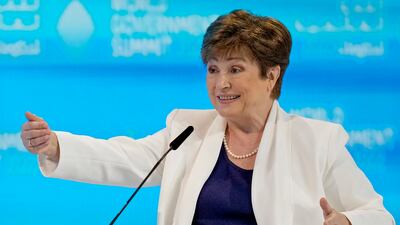Developed economies should increase efforts to help the global economy recover from challenges, the heads of the World Bank and the International Monetary Fund said.
Russia's military offensive in Ukraine, the sanctions imposed on Moscow as a result of the war, Covid-induced lockdowns in China, rising inflation, increasing debt and supply chain disruptions have derailed the world economy, they said on Tuesday.
IMF managing director
IMF managing director Kristalina Georgieva and David Malpass, the lender’s president, urged the advanced economies to accelerate efforts to achieve inclusive growth.
“We are facing a major setback for the world economy," Ms Georgieva said.
"The pandemic’s impact is still not over and on the top of it we have Russia invasion of Ukraine … devastating the people of Ukraine but also impacting countries both close and far.
“Our growth projection for this year is 3.6 per cent compared with 6.1 per cent for 2021 when the recovery was picking up momentum.
"The negative impact of war goes to so many places and we are downgrading 143 countries, some 86 per cent of the world’s GDP [gross domestic product].”

The IMF on Tuesday projected global growth at 3.6 per cent in 2022 and 2023, revising it down 0.8 and 0.2 percentage points from its January forecast.
The revision largely reflects the global spillovers of Russia’s military offensive in Ukraine and its devastating effect on both of their economies.
“People’s income is moving down while hardships are going up … [we] also recognise extreme uncertainty," Ms Georgieva said.
"War might get worse, sanctions can tighten up, Covid can again roam around the world, and we can have shocks leading to failure of crops. It is a tough time for policy makers."
On Monday, the World Bank also cut its forecast for global growth to 3.2 per cent, from its earlier expectation of 4.1 per cent.
“Pressure on low-income countries is building up fast," Mr Malpass said. "We hope for peace and ways so that war can be stopped and some of these crises can be alleviated.
"It is critical to focus on more supplies … I am concerned with the [growth] forecast. The slowdown from 2021 is substantial.
“Advanced economies must really step forward with food production, fertiliser production and above all the core element is [the] energy production problem as world tries to get away from the Russian energy supplies.
"I am just back from Poland and Romania. I am concerned because the challenge of energy crisis is immense … [due to the] dependency on Russian natural gas.”
Russia is the world’s third-largest oil producer and the largest exporter, with about 5 million barrels a day of its crude representing about 12 per cent of global energy supplies.
About 60 per cent of Russia’s oil exports go to Europe and another 20 per cent to China, the International Energy Agency says.
Ms Georgieva and Mr Malpass were speaking at an online conference titled, "The Way Forward: Responding to Global Shocks and Managing Uncertainty", which is part of the Spring Meetings of the World Bank and IMF.
The timeline for emerging markets and developing economies to return to the pre-pandemic growth projections is also dismal, Ms Georgieva said.
By 2026, the emerging market and developing economies will be still 6 per cent below their 2019 projections, she said.
The advanced economies have a “moral obligation to generate more opportunities, more growth and support financially vulnerable countries”, she said.

The education sector in poor economies has taken a hit since the onset of the pandemic, the Word Bank said.
Children lost more than a year of education due to the school closures amid the health crisis, with 1.6 billion out of school globally at the peak of lockdowns.
“There is a reversal in education," Mr Malpass said. "Schools were closed due to the Covid, and data showed very clearly the backsliding in education and literacy.
"Above 70 per cent of children in low-income countries are not able to read basic text at 10 years of age. Reading literacy has gone downward and it impacts the whole world."
The current generation of pupils risk losing $17 trillion in lifetime earnings in present value, equal to nearly 14 per cent of today’s global economy, because of the Covid-related school closures, a December report by World Bank, Unesco and Unicef said.


